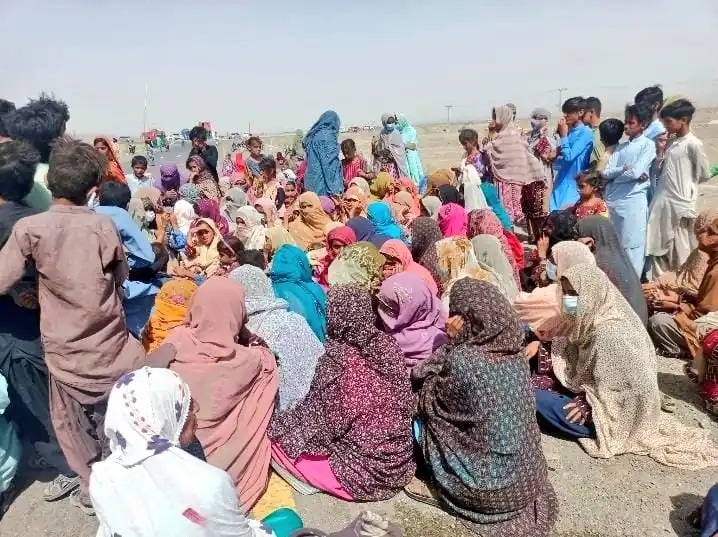
Gwadar is the symbolic ‘crown jewel’ or the main entry point of CPEC in Pakistan. Gwadar Rights Movement Maulana Hidayat ur Rehman Baloch and other leaders understand the criticality of the issue for both the Pakistan government and Beijing. Consequently, they are pressing for the demands by blocking the Gwadar East Bay Expressway, the main artery of Gwadar region. Through this movement, Maulana is also looking at his political future in Balochistan … writes Dr Sakariya Kareem
Balochistan’s strategically significant Gwadar district remains on the boil as the ‘Haq Do Tehreek’ (Gwadar Rights Movement) protest movement entered the second month on December 25. Protesters have been holding a ‘sit-in’ at the Gwadar East Bay Expressway, the road leading to key installations like the Gwadar seaport and the under-construction Gwadar International Airport.
On December 24, the Balochistan government and protest leaders held the latest round of negotiations but failed to make any headway. The movement’s head Maulana Hidayat ur Rehman Baloch claimed the government officials who had attended the negotiations had “no authority” to implement their demands. Consequently, tensions prevail in Gwadar including road blockades, which are hindering the movements of Chinese engineers and local labourers who are working on China-Pakistan Economic Corridor (CPEC) projects in the region.

The ‘Haq Do Tehreek’ leadership does not have any faith in the Balochistan government. Whereas, the political leadership in Islamabad is extremely weak and ignorant of rightful demands of the Baloch people. They are all catering to Chinese commercial interests in Balochistan through CPEC projects. Last year, Rehman led a similar protest for 32 days, after which the Pakistan government negotiated with him and assured that his demands would be met. Despite official assurances, Gwadar continues to face same problems, especially increasing Chinese influence on local maritime and mining resources. The movement’s leadership learned hard lessons last time and has warned the government that “if our demands are not met our sit-in will continue.”
Participants are demanding an immediate ban on illegal trawling in Balochistan’s maritime boundaries, recovery of missing Baloch people, closure of unnecessary security checkpoints, primacy to local workers over Chinese citizens, maximum concessions in border trade with Iran, end to narcotics, among other Gwadar-related issues. Expectedly, both the local and federal governments have ignored these demands and deadlines given by the protestors to implement these points. Thousands of residents, including women and children, have blocked the main expressway leading to Gwadar port and raised anti-government slogans to pressure the policymakers in Islamabad. On December 2, protestors staged a sit-in outside the Gwadar International Airport to “put pressure on the government for the acceptance of its demands.”
On December 10, thousands of women rallied in Gwadar to show solidarity with Maulana Rehman. Whereas on December 16, Maulana and his supporters displayed weapons, implying that violent ways could be used against those responsible for infringing on the Gwadar residents’ rights. More importantly, Maulana has issued a stern warning to the Chinese nationals living in Gwadar. Media reports suggest that there are fewer than 500 Chinese in Gwadar, all of them based in the Gwadar Port compound.
This warning is noteworthy because Rehman and other protestors largely avoided threatening to China openly in the last year’s protests. Maulana further warned that if the government “ignores” peaceful protests, then the participants have a right “to pick up and use weapons to protect our rights.”
Islamabad cannot dare to implement any demand which may hurt Chinese commercial and strategic interests in Gwadar. Pakistan is going through a deep economic crisis and Beijing is at the forefront to save the country from a looming default crisis. Besides helping its “all-weather friend,” Beijing is mostly concerned about its own financial investments in Pakistan. Gwadar is the symbolic ‘crown jewel’ or the main entry point of CPEC in Pakistan. Maulana Rehman and other participants understand the criticality of the issue for both the Pakistan government and Beijing. Consequently, they are pressing for the demands by blocking the Gwadar East Bay Expressway, the main artery of Gwadar region.
Through this movement, Maulana is also looking at his political future in Balochistan. In June this year, the Haq Do Tehreek had won an unprecedented 28 out of 34 seats in the local body elections in Gwadar. The situation was similar in Pasni and Ormara, where it had secured most of the seats. The favourable outcome gave more political teeth to Maulana’s movement in Gwadar. His confrontational politics is seen as a well-crafted strategy to create political grounds for future elections in Balochistan. He is eyeing the provincial seat in Gwadar, which is presently held by Hammal Kalmati. Interestingly, Rehman belongs to a fishermen’s family from the Surbundan area of Gwadar. Maulana is also a respected religious figure considering his Jamaat-e-Islami (JI) affiliation and is currently serving as the general secretary of its Balochistan chapter. It is noteworthy that JI has been historically close to Pakistan army. Some people are suspecting Maulana’s ‘real’ intentions behind the movement.
Chinese citizens are facing increasing threats from different militant groups in Pakistan. There have been recent incidents of targeted attacks on Chinese nationals. The growing anti-China sentiments in Gwadar is a reality now, which may adversely impact the progress of key CPEC projects. Pakistan’s government will remain ignorant to the ‘Haq Do Tehreek’ demands as it is sufficiently distracted by the ongoing economic and political crises. In absence of a peaceful solution, Pakistan’s military may also use violent force to disperse the protestors and arrest Maulana Rehman.


